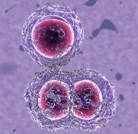Why is MRSA dangerous?
 Besides the growing significance of S. aureus as pathogen of nosocomial infections, its resistance against a number of antibiotics has become increasingly worse. MRSA is not only resistant against all beta-lactam antibiotics, but is also often multi-resistant against several classes of antibiotics. MRSA infections involve the skin or deeper areas of the body in the form of, for example, wound infections, lung inflammation or sepsis. The disease-causing properties of MRSA are not differentiated from those of antibiotic-sensitive staphylococci.
Besides the growing significance of S. aureus as pathogen of nosocomial infections, its resistance against a number of antibiotics has become increasingly worse. MRSA is not only resistant against all beta-lactam antibiotics, but is also often multi-resistant against several classes of antibiotics. MRSA infections involve the skin or deeper areas of the body in the form of, for example, wound infections, lung inflammation or sepsis. The disease-causing properties of MRSA are not differentiated from those of antibiotic-sensitive staphylococci.
 Because of its multi-resistance infections with MRSA however, are generally very difficult to treat. MRSA infections must therefore be treated with special antibiotics which in part can only be administered upon suspicion, have more side effects, and are additionally very expensive. For therapy, antibiotics such as, for example, linezolid, synercid, vancomycin and teicoplanin are available.
Because of its multi-resistance infections with MRSA however, are generally very difficult to treat. MRSA infections must therefore be treated with special antibiotics which in part can only be administered upon suspicion, have more side effects, and are additionally very expensive. For therapy, antibiotics such as, for example, linezolid, synercid, vancomycin and teicoplanin are available.
back to the MRSA overview